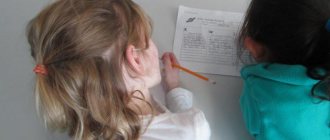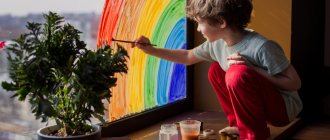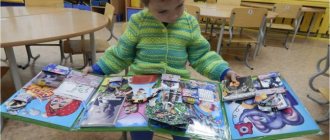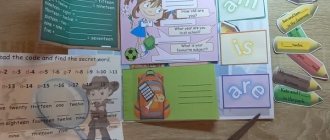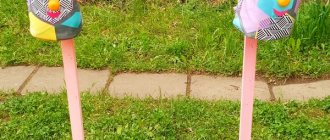Progress of classes in kindergarten
Leading:
- Today we are going on a hike. Many discoveries await us. But our hike is not an easy one, a gathering of tourists - that’s what it is! With you, we are not children now, we are adult tourists. We will cope with everything bravely, We will overcome everything along the way. Our hiking trip will bring us health.
The teams that will go on the hike are:
- "Lightning",
- "Tiger cubs"
- "Sun",
- "Tourists"
- "Beetles."
Teams greet with chants.
Team "Beetles":
— We are mobile beetles: Two legs and two arms. We don’t sit still - We will win here and there!
Team "Sun":
— The sun is shining brightly, brightly! It's hot and hot for us from the sun! Sunshine, warm up more. Warm the water in the river for us! Sun, air and water are always great with them!
Team "Tiger Cubs":
- One, two! Three four! Three four! One, two! Hey guys, step up! No, probably, in the whole world there are more fun, friendly guys! There is no sadness in our family! We sing, draw, dance!
Team "Tourists":
— Who walks with a backpack? - We are tourists! - Who is not familiar with boredom? - We are tourists! — Our motto: “Always forward!”
Team "Lightning":
- Hey guys, step up! What does a tourist take on the road? - A song, a spoon and a backpack! Who's behind? Don't fall behind! Who's tired? Cheer up! Be healthy! Always healthy! Our best friends! Sun, air and water. Sun, air and water are our best friends!
Presenter: – Before competing, you must warm up.
Warm-up “Radiant Sun” is carried out.
Presenter: - Well done! You conducted the training very cleverly. Are you ready for the hike?!
Children: - Ready!
Presenter: - Well done. Let's go on a hike. Each team will follow its own route.
Team captains receive a route sheet. The journey through the stations begins.
Acclimatization
Children in Cyprus
Children endure climate change more difficult than adults and adapt in up to two weeks. How to shorten and facilitate adaptation?
- Travel to a region with a similar climate.
- Do not change the standard time by more than 2 hours.
- To travel in hot climates, choose the off-season.
- Try to arrive early and get used to the new area.
- Let me get some sleep.
- Give your child more vegetables and fruits, but don’t get carried away with unusual ones.
- Drink water more often.
- Returning to the cold, do not rush to walk.
- Don't rush to kindergarten. Rest at home for a few days and let your baby sleep longer.
An excellent option in the south without the heat is the Elbrus region with children. And the mountains are in full view, and there are no problems with adaptation.
TOURIST'S CORNER station
Lisa comes out to meet you.
Fox:
- I am a cunning cheat, Red head, Fluffy tail - beauty! And my name is Lisa!
Presenter: - Hello, Lisa!
Fox: - Hello, tourists. Do you know what things you need to take on a hike?
Children: - Yes!
Lisa: - Let's check now. Let's pack all the essentials into a backpack. The main rule of a tourist is that you should not take on a hike what may be useful, but only what you cannot do without.
Teams are invited to the start.
The game “What will be useful on a hike?” is played.
For children of primary preschool age:
The child takes the required item, runs in a straight line two meters and puts the item in the backpack, then runs back.
For children of senior preschool age:
Two participants are selected. In front of them are items that are necessary for the hike, and those that are completely unnecessary (canned food, mugs, spoons, juice, toys). At the Fox’s command, the children pack only the items necessary for the hike into their backpacks.
The relay race “Who is faster?” is held.
Children stand in columns behind the starting line. At the start there is a hoop with items that are necessary on the hike - canned food, mugs, spoons, juice. The child takes the required item, runs around three “snake” limiters located at a distance of two meters, puts the item in the backpack, and runs back.
Lisa: - Well done, guys! We completed the task. Goodbye! It's time for you to continue on your way.
Changing your daily routine
The hike gets up earlier. Source: katerinacost.ru
Children's sensitivity to routine varies: some sleep whenever they can, while others schedule their day minute by minute. It will not be easy for the last ones on the hike - we choose family trekking and stick to the usual schedule.
But even here there are no surprises. The baby may sleep twice instead of once or not sleep until the evening. Passengers of ergo backpacks sleep on the move and frolic in the parking lot.
Calm, just calm! Adaptation will take place and everything will work out.
How to organize a baby's nap during a hike?
The baby fell asleep in the carrier and is resting on the mat.
When preparing for a group hike, check with the organizers about the approximate daily routine and age of the children who have signed up.
At home, shift your routine by 15 minutes in both directions.
A good rest is sleeping on a flat surface. If you notice that the baby is nodding off, put him on the mat and rest yourself.
Station WE WILL SAY “YES!”
Doctor Pilyulkin: - Children, hello! I know that you want to be the healthiest person in the world. I have prepared tasks and a game for you. For completing each task correctly, I give you a piece of paper. Whichever team has more of them will win.
Assignments from Doctor Pilyulkin.
The doctor asks the children questions:
- What is health? — Strength, intelligence, beauty, happiness.
- What should you do to be healthy? - Temper yourself, follow a daily routine, walk in the fresh air, eat right, ventilate the room.
- How should you help your health? - Take care of your eyesight and do not sit for a long time in front of the TV or computer, watch your posture, cross the street carefully.
- Which mushrooms are edible and which are not? (On the table in front of Doctor Pilyulkin there are cards on which mushrooms are depicted. Children must attach edible mushrooms to one board with a magnet, and inedible mushrooms to the other).
Doctor Pilyulkin: - Well done! Now let’s play the game “The Most Dexterous”.
The game “The most dexterous” is played.
Mushrooms are arranged in a circle. There are several fewer of them than participants. At a signal, the children begin to move in a circle; at a second signal, they quickly take one mushroom. Whoever did not have time to take the mushroom leaves the game. The presenter gradually removes several mushrooms. The game continues until there are only a few participants left - the most dexterous ones.
Doctor Pilyulkin: - Well done, guys! We completed the task. Goodbye! It's time for you to continue on your way.
What if something happens?
Mom is on guard for safety.
The biggest fears are in the head. Properly organized trekking is no more dangerous than a children's playground, but for this, everyone must follow the rules of the trek.
Discuss with your child in advance what to do:
- obey you and the instructor;
- be near;
- do not touch unfamiliar plants and wild animals;
- talk about all your experiences.
For extra safety, pack a first aid kit. Watch your baby carefully and everything will be fine.
Station ECOLOGICAL
Baba Yaga: - What's that noise? What's all the fuss? Who are you and where did you come from? Well, turn back! I won't let you in! There are all kinds of people walking around here! The forest is being littered!
Educator: - We are not just anyone, we are tourists!
Baba Yaga: - Those guys also called themselves tourists, but look what they did! And what a clearing it was! I frolicked here as a child, when I was only a hundred years old! Oh! What was the air like! Aroma! And now? That piece of paper will lie for three years, or maybe more, until nature digests it. And this plastic bottle will not disappear even in fifteen, or even twenty years. What are you watching? Go away, I said I won’t let you in!
Educator: - Dear Baba Yaga, our guys know how to behave in the forest.
Baba Yaga: - And we’ll check this now.
Ecological signs.
Baba Yaga will test children's knowledge of environmental signs:
- Don't trample flowers or grass.
- Carefully extinguish the fire when leaving the resting place.
- Don't shout, don't play loud music.
- Don't tear up the cobwebs.
- Don't break tree branches.
- Don't destroy birds' nests.
Baba Yaga: - Well, tell me, where to put the garbage after yourself?
A competition is being held to see who can collect the trash the fastest.
Children put on gloves, take garbage bags and, when given a signal, quickly put garbage in them.
Baba Yaga:
- I will tell you from the bottom of my heart - All the guys are good! They cleared a clearing for me.
- Look at this fire. Did his previous children prepare him correctly? What is missing?
The competition “Cover the fire with stones” is being held.
Baba Yaga: - Well done, guys! We completed the task. Goodbye! It's time for you to continue on your way.
Come up with interesting goals
At the same time, children get tired of monotony. To maintain motivation, plan your day trips so that the scenery changes frequently: it’s nice to go from a dense forest to an alpine meadow, and spending the night on a lake is an adventure. Walking for a long time along a wide dirt road is also boring: children jump much more cheerfully along a narrow rocky path.
It’s good if you encounter various “attractions” along the way: a colorful village, grazing cows, a blueberry or raspberry garden, a church, a cave. If nothing special is happening around, tell your child about everything in the world: what the trees are called and why the leaves are green, where the sun goes at night and why it rains.
For inspiration: Top 10 most photogenic places in the world
VESELAYA TRAPINKA station
For children of primary preschool age:
Children walk in pairs along the path. At the “tree” signal, they stop, hold hands, raise them up and slightly move away from each other, forming a tunnel. The last couple in the column runs under the raised hands of the children and stands in front of the column.
Each pair completes this task. When all the pairs have run and taken their places, the walking continues.
For children of senior preschool age:
The task for children is no different from a group of children of primary preschool age. Only the “bump” signal is added. At the signal “bump” the children stop. Holding hands, they move away from each other at arm's length and squat down, making a hummock. The last pair steps over all the bumps, sits down in front of the column, and makes the same bump. All pairs do the same thing one after another.
The game ends as soon as the first pair returns forward to their place.
Buy your child trekking clothes
Fight your instinct to dress your child in cotton and take a closer look at technical trekking clothing. High-quality sportswear is pleasant to the touch, breathes well, wicks away moisture and dries quickly. As a result, they are less likely to break down, which means you will need fewer changes of clothes.
For example, if a child sweats or washes his hands carelessly while wearing a cotton T-shirt, it will have to be replaced with a new one. A T-shirt made of polyamide will not suffer from sweat (it is removed from the skin and evaporates), and a wet sleeve will dry in half an hour.
In case of rain, bring waterproof pants and a jacket, as well as a fleece suit to wear on cool evenings. Children do not know how to endure - they must be comfortable throughout the entire hike.
Exactly how much to take depends on the hiking conditions. But on average, a preschooler needs two changes of clothes for a two-day hike in good weather.
Knives, forks and burners: What can and cannot be carried in hand luggage and luggage
Station TOURISTIC
Lesovichok: - Hello, guys! You came to me on foot. Do you know what else you can travel on? What types of tourism exist?
Children: - Water, horseback, ski, automobile.
Lesovichok: - Correct! Only when traveling can dangers await you, and you must know how you can help yourself and others.
Lesovichok asks the teams questions. For each correct answer the team is awarded a piece of paper.
Tasks on knowledge of rules of conduct in the forest:
- If you scratch yourself in the forest, but you don’t have iodine or brilliant green with you, what can you use to lubricate the scratch?
- If you are bitten by a wasp, what will you do? - You need to pull out the sting, lubricate the bite site with soap.
- If you hurt your knee badly, what will you do? - You need to wash the wound, treat it, bandage it.
- If you find a tick on your body, what will you do? — You need to tell an adult, lubricate the skin with oil, and when the tick starts to emerge from under the skin, you need to carefully pull it out with a needle and consult a doctor.
When going to the forest for nature, remember the safety rules:
- Wear clothes that fit your body tightly.
- The jacket must be tucked into trousers, a scarf, a hood, and a cap on the head.
- When you return from the forest, immediately examine your body. The best way to see an attached tick is in the sun. If you find a tick on your body, immediately inform an adult about it - you cannot cope with this problem yourself.
- If you get a thorn under your skin, what will you do? - You need to tell an adult, treat the needle with alcohol and pull out the splinter with a needle.
- What to do if you hit your head and get a bump? - You need to apply something cold: a cold spoon, a handkerchief soaked in cold water, a wet newspaper.
- What to do if you are bitten by mosquitoes? - You need to lubricate the bites with brine - salt water. This will help reduce itching.
- What to do if you meet a wild animal in the forest? - You can't run away. It is best to freeze, then the beast will go its own way. If an animal is about to attack you, call an adult for help and climb a tree.
Lesovichok: “ I want to offer you horseback riding today.” What will this type of tourism be called?
The relay race “Equestrian tourism” is held.
Children gallop at a straight pace, racing in pairs to a landmark and back.
Lesovichok: - Well done, guys! We completed the task. Goodbye! It's time for you to continue on your way.
Decide on the format of the trip
Think about what kind of hike you would like to go on with your children. The more precisely you formulate the format of the trip, the easier it will be to choose a place and a specific track. To make it easier to decide, answer yourself these questions:
1) Do you want to follow the route and spend the night at different points? If not, stay in one place, for example, in a mountain camp, and take day trips around the area;
2) Are you ready to carry your things? If not, look for a trek where you can a) spend the night in guesthouses and eat in cafes, then a small backpack with clothes and children’s things will be enough for you, or b) hire a car, porters or rent horses that will deliver the backpacks to the next overnight stop;
3) What level of comfort do you need? If you don't want to sleep in a tent, look for routes where you can spend the night in huts, tourist shelters, guesthouses or hotels.
Tent of Lords: The best glamping spots in Russia and abroad
Find cozy accommodation
Leave extra things at home
When you are going on a hike with a child, you want to plan for absolutely everything. As a result, backpacks become too heavy to lift, and parents become tired and irritable from carrying heavy loads. If you are not going to the North Pole, then you will not need much stuff.
A tent, sleeping bags, rugs, dishes, toothbrushes, a first aid kit - all this is not much different from the usual adult kit. Also try not to overdo it with clothes.
For guidance, take lists from experienced hikers: here, for example, is equipment and food for a family with a baby in the fall in the middle zone and a universal list for young tourists of any age. Tailor things to your needs and ruthlessly cross out everything you can do without.
Instructions: How to assemble a backpack so that everything fits and nothing gets wrinkled

